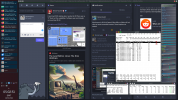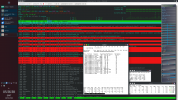Hi there,
I have set up a FreeBSD desktop (14.1) on fairly old hardware (AMD FX-8370, GeForce GTX960).
Everything works alright, except one thing: I'm experiencing sporadic freezes. These freezes are permanent.
Input does not work, images are still. Only hard reset helps.
This happens when I have Firefox open (occasionally MOC for music) and browse image intesive sites (e.g. comics).
Something like this happened a few years ago, with the same hardware.
Then I suspected graphics driver but it was faulty RAM.
This time RAM is OK, I checked with memtest, so that seems out of the question.
How would I go about debugging this?
I have set up a FreeBSD desktop (14.1) on fairly old hardware (AMD FX-8370, GeForce GTX960).
Everything works alright, except one thing: I'm experiencing sporadic freezes. These freezes are permanent.
Input does not work, images are still. Only hard reset helps.
This happens when I have Firefox open (occasionally MOC for music) and browse image intesive sites (e.g. comics).
Something like this happened a few years ago, with the same hardware.
Then I suspected graphics driver but it was faulty RAM.
This time RAM is OK, I checked with memtest, so that seems out of the question.
How would I go about debugging this?




